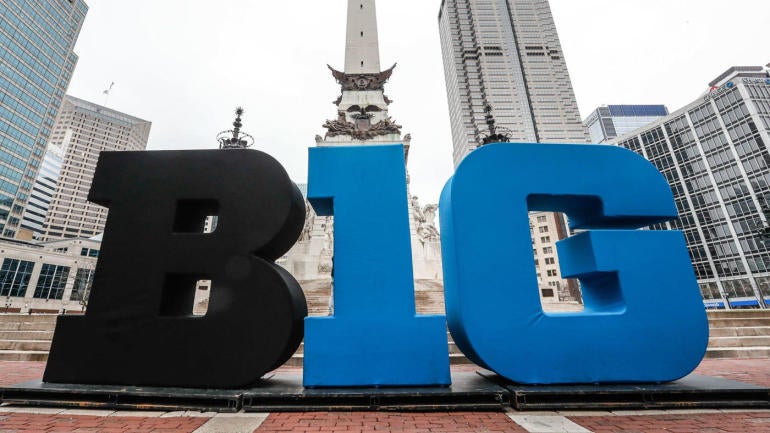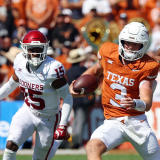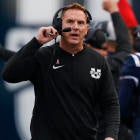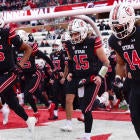
Amazon has emerged as a significant party in college football media rights talks and therefore may become a player in further conference realignment, CBS Sports has learned. The technology giant has been linked to all three conferences that figure to come to resolutions on conference composition in the coming months given its interest in the Big Ten, Big 12 and Pac-12, according to industry sources.
The issue is quality of available content. While Big Ten commissioner Kevin Warren remains interested in adding Pac-12 teams, his top games have already been distributed elsewhere after the league signed a new media rights deal with CBS, Fox and NBC last month.
Amazon finds itself in a situation where it is likely weighing whether to buy top-tier games from the Big 12 and/or Pac-12 compared to lower-profile options from the Big Ten. The Big 12 and Pac-12 are already in competition seeking new media rights deals with Fox and ESPN believed to be the primary bidders.
How many games would Amazon want and at what expense? There is still skepticism within the industry about the viability of major live sports events that are only made available through streaming services.
"Streaming is going to continue to grow," one industry source told CBS Sports, "but there is a reason why the NFL is still [largely] on network television."
Another industry source surmised that, in further expansion, there would be no Big Ten games available for Amazon involving the most attractive teams (think Michigan, Ohio State, Penn State). That reality would have to be considered against top Big 12 games such as Oklahoma State-Cincinnati and Houston-Texas Tech. Are those games more desirable than downstream Big Ten content?
In a historic deal finalized last month, the Big Ten's entire package of football games -- approximately 112 per year -- is now spoken for across CBS, Fox and NBC beginning in 2023. Games will also air on FS1, Big Ten Network and Peacock with CBS games simulcast on Paramount+.
However, Amazon getting involved with college football could change the paradigm. The platform would surely use its NFL "Thursday Night Football" package to promote college games on Saturday and vice versa. Warren was known to be previously interested in getting a major streamer involved in that existing Big Ten deal.
If Amazon wants to join the Big Ten party, doing so would require the conference to expand beyond its forthcoming additions of USC and UCLA. California, Oregon, Stanford and Washington would create more inventory, but at what cost? The Big Ten's decision makers -- and its new rightsholders -- have shown little interest in expanding the league beyond 16 teams as any additional programs would not hold equal value.
The likes of Indiana, Maryland, Minnesota, Purdue and Rutgers would be unlikely to support expansion. It's some of their games that would largely be placed on Amazon if the conference grows further.
That doesn't mean Big Ten expansion is a dead topic. Oregon and Washington have reportedly met with Big Ten officials, according to Stadium. Warren only has to convince his presidents, who are responsible for the purse strings. He could be selling them on a 20-team Big Ten that would be positioned as the biggest, best academic and athletic conference ever.
Would Amazon be interested in being part of that?
A tech giant streamer arriving in the college media rights space has long been a subject of speculation. In other words, when would it make sense financially for FBS conferences and a major streamer to partner? Apparently not yet. Amazon reportedly bid more for the Big Ten's 3:30 p.m. and primetime windows than other Big Ten suitors, according to The Athletic. If the Big Ten indeed turned down such an offer, the concerns were likely distribution and visibility.
The consensus among industry experts is that streaming remains "on the come" as a platform for college rights. That's why the Big Ten went big with broadcast partners CBS, Fox and NBC.
But that future is coming. Amazon's 11-year deal with the NFL for "Thursday Night Football" is reportedly worth $1 billion per season. Apple recently signed an 10-year deal with MLS for all its inventory at $250 million per year.
Approximately 85% of U.S. households have at least one streaming service. However, 85% isn't 100%.
The question remains: Is there enough desirable content in the Big Ten/Big 12/Pac-12 for Amazon to get involved? The Big Ten is attractive, suggested one insider, but is it that attractive?
"Otherwise, what's the point?" an industry source said. "That's why they bid on the NFL. They got high-level games."
California reviewing UCLA's Big Ten move
UCLA plan to align itself with the Big Ten will be reviewed by the University of California Board of Regents at a Wednesday meeting. Some regents -- and Gov. Gavin Newsom -- remain upset at the clandestine nature of UCLA's move. They found out about it around the same time the public did on June 30.
Sources tell CBS Sports there is a 1% chance UCLA will be compelled by the regents to stay in the Pac-12. More likely: UCLA will share revenue from its Big Ten deal with Cal to appease the regents.
Big Ten teams are estimated to be receiving $75 million annually beginning in 2023. The question remains: If Cal wants to go to the Big Ten with three other Pac-12 schools, would it be worth taking a reduced payout below the $75 million being received by UCLA but above a figure the Pac-12 can achieve in its new media rights deal?
Big 12/Pac-12 shootout
Big 12 commissioner Brett Yormark said publicly for the first time that his conference is looking toward the West Coast. "Obviously, going out West is where I would like to go," Yormark told The Athletic. "Entering that fourth time zone. A program that has national recognition. One that competes at the highest level in basketball and football, stands for the right things, is a good cultural fit."
Not that that was much of a surprise. CBS Sports reported early after USC and UCLA left for the Big Ten that the Big 12 desired Arizona, Arizona State, Colorado and Utah from the Pac-12.
It's not too hard to discern that Yormark was at least referring to Arizona in his remarks. The Big 12's potential in basketball -- which is "deeper" than the Pac-12, according to a media rights expert -- might tip the deal. Think of Big 12 basketball in expansion that could boast Arizona, Baylor, Cincinnati, Houston, Iowa State, Kansas and West Virginia.
The tug-of-war also continues over the so-called "fourth window" that ESPN desires for late-night Saturday programming. Will the Pac-12 be able to keep all its teams and that valuable fourth window, or will it have to share it with the Big 12?
Stay up late and stay tuned.
















